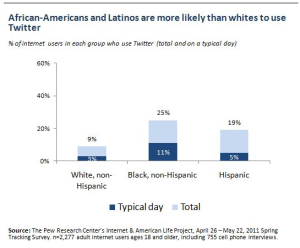Can Twitter close the political participation gap among racial and ethnic minorities in the US? Digital inequality takes on many guises, from a “new digital divide” that separates those with high speed Internet access from those with slower connection speeds to a gap in the development of the digital skills needed to access Web resources in empowering ways.
The relationship between social connection and political engagement is difficult to wrap one’s arms around. On one hand it creates challenges for democratic life by compeling us to see public life through the lens of our personal networks. But on the flip side, those who value and cultivate connection might be more disposed to benefit from social media. A recent Pew survey found that Blacks and Latinos in the United States were significantly more likely than whites to be “early adopters” of Twitter.

Without looking deeper into the data, I can’t produce a good answer as to why this is the case, but one suspicion I have is that Blacks and Latinos in the US are more prone to communitarian values than non Hispanic-whites in the US who might be more individualistic in their world view (broad generalization, I know). If this is the case, Blacks and Latinos might be more drawn to the ability to forge and sustain community via Twitter. Twitter allows for the development of connections based on communities of interest. As such, they are more oriented to the formation of new, much thinner, bonds than is Facebook, which is mostly based on pre-existing networks.
A research question I am currently purusing with Jessica Lavariega Monforti at the University of Texas-Pan American asks whether acquiring digital skills leads to increased feelings of trust and efficacy among Blacks and Latinos in the US as compared to Non-Hispanic Whites in the US. If the proposition that Blacks and Latinos are more prone to a communitarian world view and hence forming thin-tie social networks via Twitter, then the social network could be a source for closing the civic and social divide in America. Too early to tell of course, but an interesting research journey to embark upon.

Comments 4
Kenneth M. Kambara — January 13, 2012
José,
It would be interesting if you were able to identify different patterns of both configurations and behaviors along the lines of different microcultures. Blacktags offer insights into how things can go viral on different platform tools (e.g., social network vs/ microblog). I don't think this does violence to your communitarian thesis, but could explain how it plays out.
Connie — February 11, 2012
After reading your entry, I was genuinely interested in the other opinions and speculations as to why a greater percentage of Twitter users are African-American or Hispanic. I stumbled upon an article on Slate.com titled 'How Black People Use Twitter' that brought up the "blacktags" that Kenneth also mentions. Essentially, the article seems to agree with your speculation that black people are likely to be more community-minded than Twitter's white users. Black Twitter users form tighter bonds on Twitter, i.e., tend to retweet, reply, and follow back more readily and frequently. I am unsure as to how this communitarian viewpoint can translate into the real world to address the social divide in the United States; therefore, I look forward to your research on this topic.
Twitter: #BeyondRacialLines « Business Government & Society III — February 12, 2012
[...] why the racial/ethnic breakdown of Twitter users is what it is. A user by the name of ‘Jose’ on ThickCulture doesn’t have all the answers to the question either; however, he speculates that “blacks and [...]
jose — February 14, 2012
Hi Connie...thanks for your post and thanks for the link to the Slate article. I look forward to reading it :-)